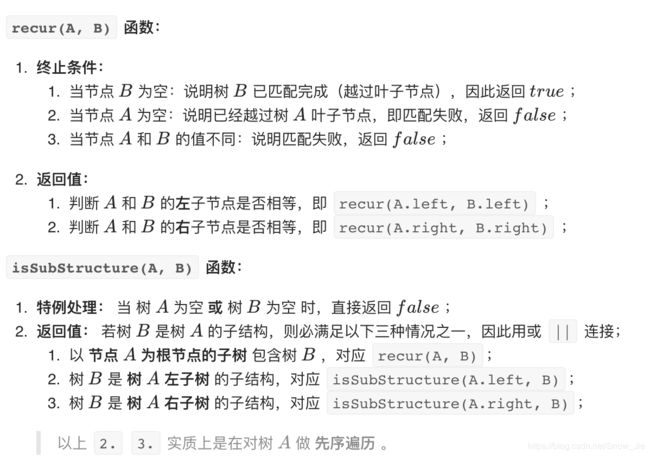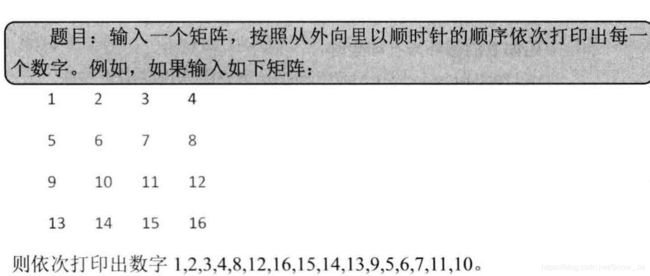剑指offer解题思路简述 21-30
- 面试题21:调整数组顺序使奇数位于偶数前面
方法一:设置前后两个指针,前面的指针往后移,当前面的指针指向的数是偶数时,后面往前移,当后面的指针指向奇数时,两个指针的数据交换,知道两个指针重合
class Solution:
def exchange(self, nums: List[int]) -> List[int]:
i, j = 0, len(nums) - 1
while i < j:
while i < j and nums[i] & 1 == 1: i += 1
while i < j and nums[j] & 1 == 0: j -= 1
nums[i], nums[j] = nums[j], nums[i]
return nums
方法二:从头遍历,偶数放一个list里,奇数放一个list里,然后拼接两个list,需要额外的空间
# -*- coding:utf-8 -*-
class Solution:
def reOrderArray(self, array):
# write code here
odd=[]
even=[]
for i in array:
if i%2==1:
odd.append(i)
else:
even.append(i)
return(odd+even)- 面试题22:链表中倒数第K个节点
方法一:先遍历一遍链表,得到链表的长度l,然后指针走l-k步
class Solution:
def FindKthToTail(self, head, k):
# write code here
#需要判断k是否超过长度或者是空链表
if head==None:return
len=1
temp=head
while(temp.next!=None):
len=len+1
temp = temp.next
if k>len :return
for _ in range(len-k):
head = head.next
return head方法二:两个指针,第一个指针走k-1,然后从第K步开始,第二个指针开始一起走,当第一个指针式到尾节点时,第二个指针正好指向倒数第k个,要注意代码的鲁棒性:判断K是否为正数,k是否大于链表长度,链表是否是空
# Definition for singly-linked list.
# class ListNode(object):
# def __init__(self, x):
# self.val = x
# self.next = None
class Solution(object):
def getKthFromEnd(self, head, k):
"""
:type head: ListNode
:type k: int
:rtype: ListNode
"""
result = head
temp = head
num = 1
while num != k and temp:
temp = temp.next
num += 1
if num != k:# 判断是否存在倒数第K个节点
return None
while temp.next:
result = result.next
temp = temp.next
return result
class Solution:
def middleNode(self, head):
slow = fast = head
while fast and fast.next:
slow = slow.next
fast = fast.next.next
return slow- 面试23:链表中的入口节点
方法一:第一步,确定是否有环,设置两个指针,一个一次走一步,一个一次走两步,当走两步的到了链表的结尾还没遇到走的慢的,则没有环,否则有环。第二步,确定环中节点的个数,在第一步的基础上,一个指针不动,另一个指针每次移动一步,直到再次相遇,计数n。第三步,重新用两个指针,一个先走n步,另一个再走,相遇的点即为入口节点
方法二:每次把节点放入set类型中,如果有重复说明即是环的入口
class Solution:
def EntryNodeOfLoop(self, pHead):
# write code here
if not pHead:
return None
plist = []
while True:
plist.append(pHead)
pHead = pHead.next
if not pHead:
return None
if pHead in plist:
return pHead- 面试24:反转链表
方法1:设置三个指针,一个a指向pHead.next,另一个b指向a.next,然后在while循环中,pHead,a,b依次往后移动
class Solution:
# 返回ListNode
def ReverseList(self, pHead):
# write code here
if (pHead==None or pHead.next==None):
return pHead
a = pHead
b = pHead.next
c = b.next
a.next= None
while(c!=None):
b.next=a
a = b
b = c
c = c.next
b.next = a
return b方法2:递归 https://zhuanlan.zhihu.com/p/60117407?from_voters_page=true 全网最详细,思路用递归先找到尾节点作为头节点,然后依次往前挨个反转
class Solution:
def reverseList(self, head):
if not head:
return None
if not head.next:
return head
headNode = self.reverseList(head.next)
head.next.next = head
head.next = None
return headNode- 面试25:合并两个排序的链表
方法一:while循环,创建两个空节点ans=res=ListNode(0),res负责反复循环里面不断指向合并链表的下一位,循环的退出条件是其中一个链表的next为空,退出后将res.next指向剩下的不为空的那个链表,return ans.next
class Solution:
# 返回合并后列表
def Merge(self, pHead1, pHead2):
# write code here
if(pHead1==None):
return pHead2
if(pHead2==None):
return pHead1
ans=res=ListNode(0)
while pHead1 and pHead2:
if pHead1.val方法二:递归,不是很懂
class Solution:
# 返回合并后列表
def Merge(self, pHead1, pHead2):
pHead3=None
if pHead1.val<=pHead2.val:
pHead3 = pHead1
pHead3.next=self.Merge(pHead1.next,pHead2)
else:
pHead3 = pHead2
pHead3.next=self.Merge(pHead1,pHead2.next)
return pHead3- 面试26:树的子结构
方法:构建一个子函数专门判断每个节点是否相等,主函数里挨个遍历左右节点作为根节点传入到前面构建的函数中。
class Solution:
def HasSubtree(self, pRoot1, pRoot2):
# write code here
if not pRoot1 or not pRoot2:
return False
return self.compare(pRoot1,pRoot2) or self.HasSubtree(pRoot1.left, pRoot2) or self.HasSubtree(pRoot1.right, pRoot2)
def compare(self,root1, root2):
if not root2:
return True
if not root1:
return False
return root1.val==root2.val and self.compare(root1.right,root2.right) and self.compare(root1.left,root2.left)- 面试题27:二叉树的镜像
方法:递归,交换左右子树,然后分别将左右节点作为根节点递归调用函数
class Solution:
# 返回镜像树的根节点
def Mirror(self, root):
# write code here
if root==None:
return None
root.left,root.right = root.right,root.left
self.Mirror(root.left)
self.Mirror(root.right)
return root- 面试题28:对称的二叉树
方法:主函数里调用判断是否为镜像的子函数,子函数里递归判断sMirror(left.left,right.right) and self.isMirror(left.right,right.left)
class Solution:
def isSymmetrical(self, pRoot):
if not pRoot:
return True
else:
return self.isMirror(pRoot.left,pRoot.right)
def isMirror(self,left,right):
if not left and not right:
return True
elif not left or not right:
return False
return (left.val == right.val) and self.isMirror(left.left,right.right) and self.isMirror(left.right,right.left)- 面试题29:顺时针打印矩阵
方法:先判断行数为1和列数为1的情况,单独处理,然后while循环,设置一个标志位,转了几圈。while(row>i*2 and col>j*2):这个是每一圈的左上角的条件。里面分成四个while循环,每个while的条件是i或者j和行数列数以及flag的关系。最后while循环结束,处理特殊情况:当是正方形且边长为奇数,则需要append最中心的数;若行列不相等且都是奇数,则pop掉最后一个数。
class Solution:
# matrix类型为二维列表,需要返回列表
def printMatrix(self, matrix):
# write code here
if matrix ==None:return []
row = len(matrix)
col = len(matrix[0])
flag = 1
i = 0
j = 0
result = []
if row == 1:
while(ji*2 and col>j*2):
while(jflag-1):
result.append(matrix[i][j])
j = j-1
while(i>flag-1):
result.append(matrix[i][j])
i = i-1
i = i+1
j =j+1
flag = flag +1
if(row%2==1 and col==row):
result.append(matrix[row/2][col/2])
if(row%2==1 and col!=row and col%2==1):
result.pop()
return result - 面试题30:包含min函数的栈
方法:建立一个辅助栈,存在当前状态的最小值,push时比较push元素和当前最小元素的值,如当前元素较小,则push到辅助栈,pop时两个栈需要同时pop
# -*- coding:utf-8 -*-
class Solution:
def __init__(self):
self.stack=[]
self.minstack=[]
def push(self, node):
# write code here
self.stack.append(node)
if not self.minstack or node<=self.minstack[-1]:
self.minstack.append(node)
else:
self.minstack.append(self.minstack[-1])
def pop(self):
# write code here
#if not self.stack:
self.stack.pop()
self.minstack.pop()
def top(self):
# write code here
return self.stack[-1]
def min(self):
# write code here
return self.minstack[-1]












